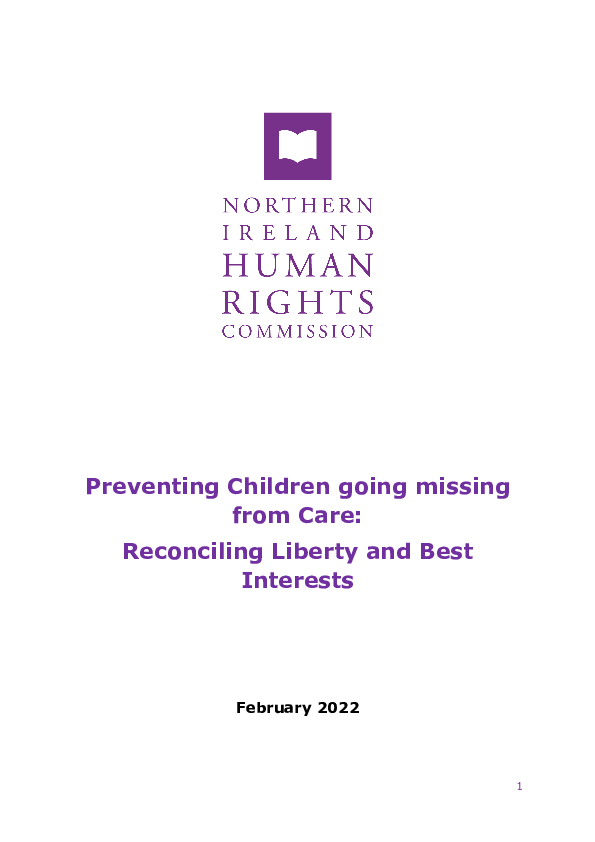Preventing Children going missing from Care: Reconciling Liberty and Best Interests
Date produced: February 2022
The Northern Ireland Human Rights Commission (NIHRC) has produced a report into preventing children going missing from care. Not only does this report contain a comprehensive analysis of the relevant legal standards, it will assist in the practical application of those standards for the better protection of children.
Below is a summary of the recommendations. You can also download the full document through the links provided.
The Northern Ireland Human Rights Commission makes a number of key recommendations. These are based on the evidence set out within this report and should not be considered in isolation, but are aimed at providing a basis on which to move forward. The NIHRC recommends:
1) A human rights based approach is adopted towards tackling the issue of children being reported missing from care. For example, Articles 2, 3 and 4 ECHR are clear that all reasonable steps should be taken to protect a child from real and immediate threats to life, ill-treatment and exploitation. Article 8 ECHR confirms that a blanket approach towards interfering with a child’s correspondence such as telephone calls should not be taken. Instead, such interference must be in the best interests of the individual child, for a legitimate aim and only for as long as is necessary. Furthermore, it is accepted that Article 5 ECHR can have conflicting priorities, but this can be resolved by looking at what is in an individual child’s best interests (for example, taking into account age) and whether there are other competing rights involved and the surrounding circumstances (for example, is there a threat of exploitation). As Article 3(1) of the UN CRC states, the best interests of the child must be a primary consideration.
2) There is a focus on early intervention. It was identified that there can be a pattern with children reported missing from care and that the act of going missing can possibly be prevented by recognising the pattern and children’s home staff, with the support of public authorities, taking steps earlier to work with the child concerned to address the issues that may lead them to leave the home without authorisation.
3) There is specialised training for public authorities and service providers that are dealing with children in care or responding to reports of a child going missing from care.
4) Children, particularly children identified as the most at risk, are educated on understanding, identifying and accessing support to protect them from grooming and child sexual exploitation. This connects to a broader piece on ensuring relationship, sex and identity education for all children in Northern Ireland comprehensively deals with what is a healthy and unhealthy relationship, and the tools or support available to help children avoid or get out of an unhealthy relationship.
5) That the good work that has been undertaken to date, for example between the Police Service NI and the Health and Social Care Board, is promptly rolled out across Northern Ireland. Any programmes going forward should be effectively developed using an evidence basis on what is working or not working (taking into account variables such as rurality), efficiently resourced on a long-term basis, and subject to regular monitoring and evaluation as appropriate. This work should also be cross-sectoral where appropriate.
6) Children and their representative organisations are consulted on how to address children reported missing from care, including the root causes and suggestions for tackling these issues. These views should be reflected in actions and targets going forward.

Download Documents
Your browser is out-of-date!
Update your browser to view this website correctly. Update my browser now